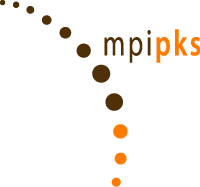
Quantum Memory from Quantum Dynamics
Workshop Report
This was a concentrated symposium with around forty-five participants from some ten different countries. The conference began on Thursday 15 June at 16:00 and ended on Saturday 17 June around 12 noon.
The aim of the conference was to assess the progress made in the theory of quantum dynamical processes of complex atomic and molecular systems over the last ten years. Of particular interest, as the name of the symposium suggests, was the role played by “quantum memory” on the time evolution of dynamical systems on a microscopic level. Indeed the role of time propagation in general was a theme throughout most of the conference talks and the importance of time dependence in physics, whether atomic, molecular, nuclear or solid state, was made evident.
The role of quantum memory in general time propagation was outlined in the talk of Strunz (Dresden) and examples of Markovian or non-Markovian behavior treated in two further talks. Helm (Freiburg) discussed the question of phase memory in quantum processes and Richter (Regensburg) introduced the intriguing possibility of quantum time mirrors. The role of time in the quantum to classical transition was the subject of three further talks.
There was a strong representation from the group of Keitel at the MPI fuer Kernphysik in Heidelberg with talks on all aspects of time-dependent processes in extreme laser-matter interactions extending to the relativistic regime and nuclear processes. Thumm (Kansas) described how time resolution can now be extended to surface photoemission.
Additionally there were several contributions on the time evolution of quantum dynamics in few-body systems from atoms to molecules, clusters and solids, indicating the breadth of application of rather similar theoretical approaches developed by the participants.
The symposium was undoubtedly a great success and all attendees carried away happy (quantum) memories of the occasion.
